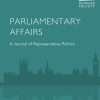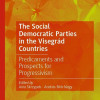Mid-term strategic plan of the Institute for Political Science (summary)
Leading the way in domestic political science: the Institute for Political Science has achieved outstanding publication performance in international journals between 2019 and 2022
Latest news

New book chapter by Ana Stojilovska and Mariëlle Feenstra ’Female Voices of Energy Deprivation The Lived Experience of Energy Vulnerable Women in North Macedonia and Austria’ has been published in the book ’Living with Energy Poverty. Perspectives from the Global North and South’ edited by P. V. Herrejón, B. Lennon and N. P. Dunphy.

New paper by Ana Stojilovska and her colleagues ’Making a Case for Centring Energy Poverty in Social Policy in Light of the Climate Emergency: A Global Integrative Review’ has been published in Social Policy and Society.

Dániel Mikecz's new book entitled "Civil Movements in an Illiberal Regime. Political Activism in Hungary" has been published by CEU Press.

New paper by András Bíró-Nagy and Áron Buzogány ’Beyond Institutional Adaptation: Legislative Europeanisation and Parliamentary Attention to the EU in the Hungarian Parliament’ has been published in Parliamentary Affairs.

The prize was given at the annual meeting of the Italian Society of Political Science (SISP).
PLEDGE - POLITICS OF GRIEVANCE AND DEMOCRATIC GOVERNANCE is a research and innovation project studying grievances and their impacts on democracy.

This book, edited by András Bíró-Nagy and Ania Skrzypek, and published by Palgrave Macmillan, analyses three decades of political developments within the Czech Republic, Hungary, Poland, and Slovakia.

The articles appeared in Neue Zürcher Zeitung and in Der Standard.

The five-year project, funded with over EUR 560 000, is entitled: "The changing global relations of the Visegrad countries in times of war - An artificial intelligence-assisted comparative analysis".

New paper by Ana Stojilovska and her colleagues Energy spaces: bridging scales and standpoints of just energy transitions has been published in the Journal of Environmental Policy & Planning.
Latest posts

In the fifth pti memo blog post, we report on a lecture by Boglárka Koller, in which she presented her project titled "Cultivating Our European Resilience and Evolution" (CORE) and its significance. Boglárka Koller is the Head of the Department of European Studies at the University of Public Service, Senior Research Fellow at the Centre for Economic and Regional Studies (KRTK), and Jean Monnet Chair. The lecture was hosted by the HUN-REN CSS Institute for Political Science on May 22, 2025, as part of its Speaker Series.

The latest post of the pti memo blog series offers insights from a thought-provoking lecture by Murat Somer, Professor of Political Science and International Relations at Özyeğin University Istanbul and Research Affiliate at the Democracy Institute of the Central European University. Titled "Quo Vadis in Turkey and Implications for Democracy in the World", the lecture explored current political developments in Turkey and their broader implications on combating democratic backsliding. The event took place on May 8, 2025, as part of the HUN-REN CSS Institute for Political Science’s Speaker Series.

The third blog post of the pti memo series summarises the lecture of Dr. Matthew Edward Bergman, Assistant Professor at Corvinus University of Budapest, titled “Ideological Conflict, Logrolling, and Policy Reform: An Analysis of Government Declarations in Western Europe.” The event was organised as part of the HUN-REN Institute for Political Science’s Speaker Series on April 10, 2025. This research, conducted jointly with Hanna Bäck (Lund University) and Wolfgang C. Müller (Universität Wien), investigates why some governments commit to more reform measures in their government declarations.

The second pti memo post summarises the lecture by Bálint Magyar and Bálint Madlovics, researchers at the CEU Democracy Institute, titled “The Russia-Ukraine War and Its Structural Consequences.” The event was organised as part of the HUN-REN Institute for Political Science’s Speaker Series on February 6, 2025.
Hungary is often portrayed as a problem case for European integration due to frequent clashes between Viktor Orbán’s government and the EU’s institutions. Yet, as András Bíró-Nagy and Gergő Medve-Bálint explain in their post on the LSE EUROPP blog, the country’s 20 years in the EU have also seen a relatively high level of compliance with EU policies and strong support for membership among the public.
.png&w=100&h=100&zc=1)
In the first pti memo post, we summarise Christian Baden’s (Hebrew University of Jerusalem) thought-provoking lecture titled “Propaganda as a Social Process.” The lecture was hosted by the HUN-REN Institute for Political Science as part of its Speaker Series event series on January 23, 2025.



















.png&w=100&h=100&zc=1)